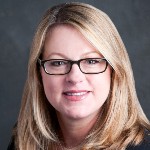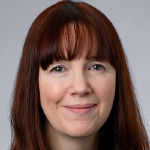- Founded for Entrepreneurs By an Entrepreneur
- SSG Advises Blue Spark Technologies, Inc. is the Sale of Substantially All Assets to BST Technology Acquisition, Inc.
- Wells Fargo Technology Banking Grows Team by 20%, Doubles Down on Positive Outlook for Tech Sector
- Sallyport Commercial Finance LLC Selects T.R.U.S.T.™ for Credit Insurance Management
- FundThrough Acquires Ampla, Strengthening its Digital-First Invoice Funding Solution
Interview with Laura Glass, Vice Chair of SFNet’s Women in Secured Finance Committee
By Michele Ocejo

Laura Kemper Glass, vice chair of SFNet’s WISF Committee, is senior vice president and senior portfolio manager for Bank of America Business Capital (BABC), part of the Wholesale Credit division at Bank of America.
Based in Atlanta, Glass is responsible for the asset-based lending portfolio in the Eastern United States and Europe. In this role, she leads a team of credit professionals responsible for managing a $20 billion portfolio of credit commitments in the asset-based lending plus related products and solutions. The team serves clients in a wide range of industries primarily in the middle market and large corporate space.
Prior to joining Bank of America Merrill Lynch, Glass was a certified public account and spent nine years with the international accounting firm, KPMG, achieving the level of senior manager. She joined Bank of America via predecessor entity Fleet Capital in 1995 as a senior underwriter responsible for underwriting new business transactions. In 1998, she joined the portfolio management team of BABC.
Glass has a bachelor’s degree in accounting from Florida State University. She is a CPA (inactive) and a FINRA Registered Principal with Series 7, 24 and 63 securities licenses. She lives in Atlanta, Georgia with her husband, Greg, and their two sons.
Please tell us about your career trajectory and your current position.
I started my lending career after spending nine years in public accounting with the international accounting firm KPMG and achieving the level of senior manager in the audit and assurance practice. I joined Bank of America Business Capital, and its predecessors, in the underwriting department as a vice president, responsible for conducting due diligence, screening and underwriting new business transactions. After three years, I moved into a credit officer role, managing a portfolio of clients. From there, I was promoted to portfolio manager responsible for a team of credit officers in the Southeast United States and later to my current role as the senior portfolio manager for the Eastern United States and Europe. In my current role, I lead a team of portfolio managers and credit officers who manage the asset-based loans and related bank products for commercial and corporate clients.
You are vice chair of SFNet’s Women in Secured Finance Committee, which is hosting a virtual conference June 16 & 23. Please give readers information on what they can expect from the conference.
I am very excited about this year’s conference! We are taking a different approach by offering an interactive workshop in lieu of panelist discussions. The theme of the workshop is “Where Women Rise,” and will be facilitated by Corporate Class Inc., who help organizations and individuals achieve success through leadership training, coaching and consulting. The program will be a two-day, six-hour virtual workshop that focuses on developing an empowered mindset and will be highly interactive with a variety of videos, individual exercises and small group discussions. There will also be plenty of time to network with the other participants during and after the workshop.
The June conference will focus on leadership. Managers had to make a quick pivot to leading remotely in 2020 and that continues today, for many. What do you feel that you, as a leader, learned during this time and what changes do you think should be kept as we move forward?
The biggest thing that I learned during this protracted time of working remotely was the importance of the small interactions that you have with your teammates and colleagues. Those conversations around the water cooler, in the hallway or over lunch are so important in building camaraderie between co-workers. That is what I have missed the most since the pandemic started. Finding ways to replace that in a remote world has certainly been a challenge. Having scheduled calls with teammates and direct reports and using video conferencing in place of conference phone calls has certainly helped, and I think will continue to be a useful tool as we move forward. Many of us manage teams in different cities and some of the practices put in place during the pandemic to stay connected from home will continue to be of benefit to those long-distance working relationships. I also believe that most employees have enjoyed the flexibility that they found by working from home, and it will be important to find ways to provide greater flexibility to our workforce than we had pre-pandemic.
You’re passionate about diversity in the industry. What do you think the secured finance industry can do to improve diversity?
I am passionate about diversity and inclusion in the workplace and previously served as the chairperson for Bank of America’s diversity and inclusion council for Global Commercial Banking. In order to improve diversity in our industry, we have to continue to educate ourselves on our differences. In my opinion, the more someone knows about a race, culture, religion that is different from their own, the more understanding and accepting they will be. I also believe that we, as an industry, need to do more on college campuses to attract more diverse candidates into finance and related majors.

